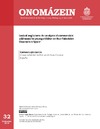Identificador persistente para citar o vincular este elemento:
https://accedacris.ulpgc.es/jspui/handle/10553/45845
| Título: | Lexical anglicisms: An analysis of commercials addressed to young children on four Television Channels in Spain | Autores/as: | Luján García, Carmen Isabel | Clasificación UNESCO: | 57 Lingüística | Palabras clave: | Anglicisms Children Spain TV commercials |
Fecha de publicación: | 2015 | Publicación seriada: | Onomazein | Resumen: | The influence of English in Spanish has led to the use of a considerable number of pure anglicisms to de-signate child-related concepts. This paper intends to examine the degree of exposure of children to English terms by analysing the increasing presence of angli-cisms in Spanish television commercials. With that pur-pose, the amount and the kinds of anglicisms present on TV commercials of four popular TV channels in Spain (Antena 3, Tele 5, La Sexta and Disney Channel) have been explored. The study reveals that English borrowings are quite present in different subject areas (food and drinks; games and toys; clothes and shoes; personal hygiene; leisure and entertainment). A classification of pure an-glicisms, adapted anglicisms, pseudo-anglicisms, and acronyms has been made, and some Anglo-American cultural icons have been analysed. English usage in global advertising is a marker of modernity, progress, sophistication. Findings in this research reveal that chil-dren in Spain are considerably exposed to this influence. | URI: | https://accedacris.ulpgc.es/handle/10553/45845 | ISSN: | 0717-1285 | DOI: | 10.7764/onomazein.32.17 | Fuente: | Onomazein [ISSN 0717-1285], n. 32, p. 288-304 |
| Colección: | Artículos |
Citas SCOPUSTM
5
actualizado el 08-jun-2025
Citas de WEB OF SCIENCETM
Citations
2
actualizado el 01-feb-2026
Visitas 10
293
actualizado el 15-ene-2026
Descargas
330
actualizado el 15-ene-2026
Google ScholarTM
Verifica
Altmetric
Comparte
Exporta metadatos
Los elementos en ULPGC accedaCRIS están protegidos por derechos de autor con todos los derechos reservados, a menos que se indique lo contrario.
